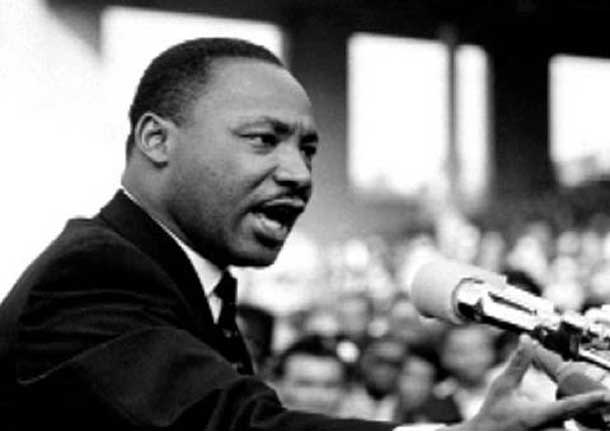
THUNDER BAY – LIVING – Merely a half century ago a place called Selma in the States became as pivotal in world news clips as the shores of India when Mahatma Gandhi went gently into that good night with his triumphant Salt marches railing against British colonialism. His non violent philosophy, with rather deft political tactics, would eventually surmount England’s military provocations, with its mightier than thou imperialism, that had shackled Gandhi’s homeland for decades.
Gandhi and India sustained much. Independence was their new horizon to proclaim.
What Martin Luther King accomplished, in the 1960’s, marching with his non-violent AfroAmerican peace protestors comes fully forward– in the two hours plus– intrinsic beauty of Ava DuVernay’s captivating film Selma.
Proving that classic line that documents world truths about suffering to obtain freedom and the ballot. And, that so often the world in all its political glory and upwellings can still so often, “Be too much with us,” Shakespeare. DuVernay possesses a remarkable artistic eye for detail and its overall ambience.
“I like making a film where silence, and it’s effects, enters for a time,” DuVernay comments about her craft.
Several examples emerge watching her brilliant portrait about the incredible hatred, red neck backlashing, King overcame establishing what were called Negro voting rights in Alabama. Her quiet scenes, with dramatic lighting in evening vignettes, catches King (in a statuesque performance by British actor David Ojelow) and his wife Coretta (played very touchingly by Carmen Ejogo) in an intimacy just temporarily removed from the streaming exterior news headlines of human rights protestors in the Deep South. Their pacifist protests being waged before TV cameras. making news headlines virtually every night as King’s drama went on.
DuVernay not only sets the tone for the quiet dialogue to come, she also reveals in a subtle way the true inspiration of King’s motives for his forces in a pacifist approach.
There, in those cameos are background images of Gandhi in a black and white photo, and, as well in a modest small sculpture. Her cast is remarkable. Ojelow who was in both Lincoln and The Butler. Oprah Winfrey puts in a touching cameo that is so befitting of the times.
James Stephen’s plays future Congressman Stephen Lewis with a respectful trumpeting as one who, openly, brazenly advocated King’s initiatives. He also lends a nobleness within the ballistic conflicts and mayhem that arise. Costumes befitting the sixties were made by Ruth Carter (and Mayes) ones who call Chicago their hometown. Where I was very fortunate to be invited to a screening on the eve of the Academies. The film’s Oscar Award winning song Glory was commissioned, composed, and, synchronized by two talented musicians also from Chicago. They are Chicago’s “brothers-in-arms.” Being Lonnie Lynn (aka Common) and John Stephens (Aja John legend). Paul Webb has written, re-written, and gradually advance his craft in writing to what is assembled on the big screen.
Webb’s realistic insights into human struggles shows how brilliantly his literary research and fascinating study of Martin Luther King’s speeches–especially ones not readily known to wider audiences– have such breadth, with an invigorating historical rhythm, as he casts things into his script. England’s iconic Economist magazine, I was reading on a plane, conveys the overall thrust in Selma.
It truly warrants a re- reading. “Oyelow playing the lead of MLK seems comfortable slotting neatly into the wider fabric (of it all). He never strains to be the only star.”
The magazine, known through decades for its timeless objectivity, continues, “this film is remarkable partly because it lacks the weight of inevitability that chokes the life sometimes from worthy historical cinema. Yet it does contain very vibrant moments with high octane drama.” The situational settings where music orchestrates movement with songs by Maheila Jackson, Minnesota’s Bob Dylan, and others, lead right up to the dramatic juxtaposition of its masterpiece composition entitled Glory. Where the taps of human tears in the eyes of our Illinois audience were fairly uncontrollable. Kleenex being readily sought.
As flashes of Martin Luther King’s bright triumphs on the screen lit the hands of one semi-blind searcher after another seeking a handkerchief of some sort. Selma carries with its very realistic relays, re-living moments, an active, tactile pulse, about the inherent drive in every patriot’s aim for equality.
